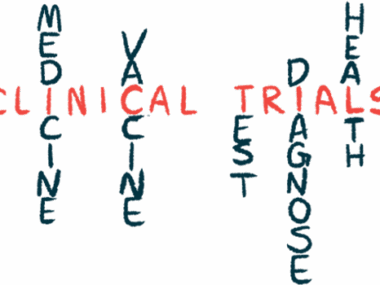Efzofitimod boosts life quality, eases fatigue in pulmonary sarcoidosis
Phase 3 trial still failed to meet main goal, but benefits seen for patients
Written by |

Treatment with Atyr Pharma’s efzofitimod, known as EFZO-FIT for short, led to improvements in general health-related quality of life and reductions in fatigue for adults with pulmonary sarcoidosis taking part in a Phase 3 clinical trial, according to new data.
Consistent with previously announced top-line results, these new data did show that the trial, dubbed EFZO-FIT (NCT05415137), failed to meet its main goal of demonstrating that efzofitimod significantly reduced the need for standard corticosteroids in adults with pulmonary sarcoidosis. Still, other benefits — notably a potentially reduced reliance on steroids and better quality of life related to lung health — were observed.
The developer believes these new data demonstrate that use of the investigational therapy can lead to meaningful daily life gains for pulmonary sarcoidosis patients.
“Despite missing the primary [goal] of the study, efzofitimod has clearly demonstrated the potential to durably improve multiple disease-related health outcomes, including cough, shortness of breath, fatigue and general health,” Sanjay Shukla, MD, president and CEO of Atyr, said in a company press release announcing the data’s presentation in a late-breaking abstract at the European Respiratory Society (ERS) Congress 2025, held last week in Amsterdam.
The results were shared at ERS by Daniel Culver, the trial’s principal investigator and chair of Cleveland Clinic’s department of pulmonary medicine, in an oral presentation titled “EFZO-FIT: The Largest Ever Interventional Trial in Pulmonary Sarcoidosis.”
According to Shukla, “these consistent clinical benefits reinforce our belief in efzofitimod’s potential to meaningfully improve quality of life and reduce reliance on chronic steroids for pulmonary sarcoidosis patients.”
In pulmonary sarcoidosis, the most common type of sarcoidosis, small clusters of immune cells, called granulomas, form in the lungs. This drives inflammation and scarring that impair normal lung function and make breathing difficult.
Efzofitimod failed to significantly reduce daily corticosteroid doses
The first-line treatment for pulmonary sarcoidosis is oral corticosteroids, a class of potent anti-inflammatory and immunosuppressive medications. However, long-term use of these treatments can cause serious side effects.
Other available immunosuppressive treatments may reduce a patient’s reliance on corticosteroids, but come with their own risks. Specifically, the broad immunosuppressive activities of such therapies can compromise the normal immune responses needed to protect the body from infection.
Infused intravenously, or directly into the bloodstream, efzofitimod is designed to make activated myeloid cells — a class of immune cells found in granulomas — less inflammatory. It does so by binding to neuropilin-2, a protein that’s abundant on the surface of these cells. It alters their activity profile to be more anti-inflammatory.
The experimental therapy is therefore expected to reduce sarcoidosis-driving inflammation without compromising healthy immune activity.
The global EFZO-FIT study — touted as the largest-ever controlled clinical trial in sarcoidosis — was designed to test the safety and efficacy of efzofitimod against a placebo in 268 adults with pulmonary sarcoidosis. The participants received 12 infusions of efzofitimod, at a dose of 3 or 5 mg/kg, or a placebo, given once every four weeks for 48 weeks, or nearly one year.
Consistent with the previously reported top-line results, the newly shared data showed that efzofitimod did not significantly reduce the mean daily oral corticosteroid dose relative to the placebo after 48 weeks. That means that the trial failed to meet its main goal.
Higher dose of EFZO-FIT leads to greatest gains in quality of life
Still, data suggested that treatment with efzofitimod led to meaningful benefits for patients, particularly at its higher dose. Specifically, a greater proportion of people given 5 mg/kg of efzofitimod than those on the placebo were able to stop corticosteroids completely (52.6% vs. 40.2%) and remain off them for at least six months.
Additionally, participants treated with high-dose efzofitimod showed significantly greater increases in the King’s Sarcoidosis Questionnaire (KSQ)-Lung score than those in the placebo group (10.4 vs. 6.2). Those data indicate improvements in quality of life related to lung health.
A significantly greater proportion of people on the high dose also achieved complete steroid withdrawal with improved KSQ-Lung scores compared with those in the placebo group (29.5% vs. 14.4%). Significant benefits were also seen with the 3 mg/kg dose, the company noted.
Lung function was generally preserved for all trial participants. The treatment also was well tolerated, according to Atyr.
The new data showed that people who received the high efzofitimod dose also experienced a significantly greater improvement in KSQ-General Health scores compared with those on the placebo, reflecting gains in life quality related to overall health.
The clinical improvements in … scores … are compelling because these directly address critical symptoms and quality of life measures that profoundly impact pulmonary sarcoidosis patients. … Crucially, the improvements observed … were achieved rapidly and sustained robustly throughout the study.
Moreover, these individuals had significant improvements in total scores on the Fatigue Assessment Scale (FAS) relative to the placebo group. Those findings suggest reductions in fatigue.
“Building on the positive data we presented in the topline results … the clinical improvements in the [FAS] and KSQ-General Health scores presented at ERS are compelling because these directly address critical symptoms and quality of life measures that profoundly impact pulmonary sarcoidosis patients,” Shukla said. “Crucially, the improvements observed for the KSQ-Lung, FAS and KSQ-General Health scores were achieved rapidly and sustained robustly throughout the study.”
EFZO-FIT participants who complete the main trial may be able to enroll in an expanded access program to continue treatment with efzofitimod.







